Local News
New documentary about David Matas chronicles his long career as a tireless advocate for human rights
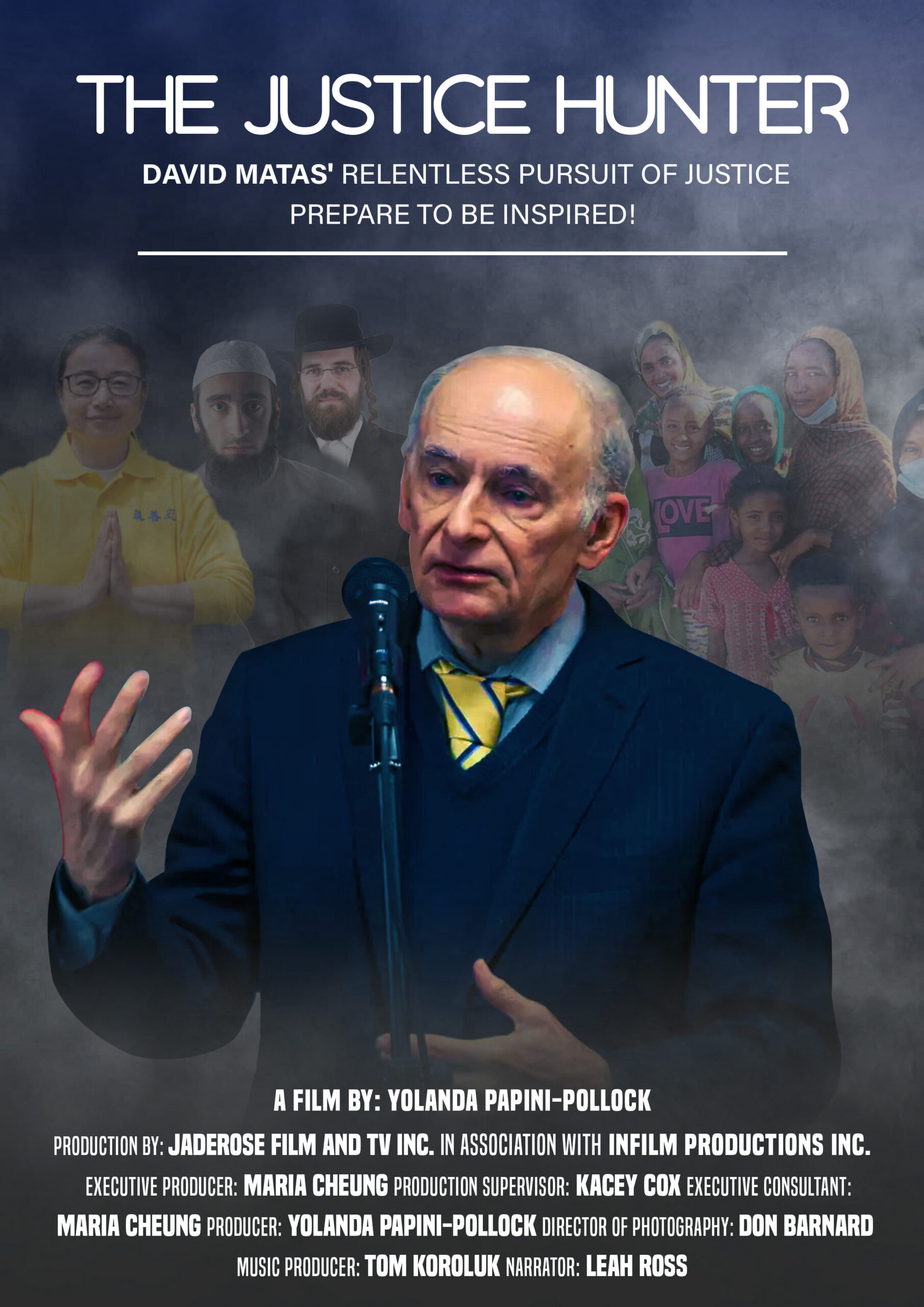
By BERNIE BELLAN David Matas has achieved world-wide recognition for his life-long work advocating on behalf of repressed minorities throughout the world. Yet, as the same time as he is probably one of the most famous – and successful individuals working in the area of human rights, his unassuming and low key style would often belie the success he has achieved.
Now, in a new documentary film, titled “The Justice Hunter,” written and produced by Israeli-born Winnipegger Yolanda Papini-Pollock (who, many readers may also know is the founder and driving force behind the advocacy group, Winnipeg Friends of Israel), viewers are given the opportunity to see Matas’s life chronicled in a very interesting – and often revealing manner.
Papini-Pollock has produced other films centering around the subject of human rights, including “Never Again: A Broken Promise,” which drew upon the experiences of survivors of four different genocides (the Holocaust, Rwandan, Indigenous and Yazidi genocides); “Get Over It: A Path to Healing,” about the health crisis facing Canada’s Indigenous communities; and ‘Painful Truth: The Falun Gong Genocide,” which tells the story of the Chinese government’s horrible record of persecution – and often, execution of practitioners of Falun Gong. Stemming from Papini-Pollock’s documentary about the persecution of practitioners of Falun Gong, she developed a particular interest in telling David Mata’s story in some detail, since no one has done more to fight antisemitism and to bring to light China’s abysmal record of persecution of the Falun Gong than David Matas.
“The Justice Hunter,” however, conveys Papini-Pollock’s growth as a documentary movie-maker. Whereas “A Broken Promise” relied primarily upon interviews with four different subjects, “The Justice Hunter” uses a much faster-paced style of movie-making. Interspersing short snippets of interviews with such individuals whose lives have become interconnected with David Matas over the years, such as lawyer and former Canadian Minister of External Affairs Irwin Cotler, the film also features the voice of David Matas himself offering observations about various aspects of his career. As well, the film also includes footage showing in some detail how the Chinese government have been complicit in the persecution of the Falun Gong, along with an interesting segment explaining how Israelis had become prime recipients of organs harvested from executed Falun Gong members until that practice was exposed by Matas and he late David Kilgour, former Member of Parliament, in a book titled “Bloody Harvest,” which was published in 2005.
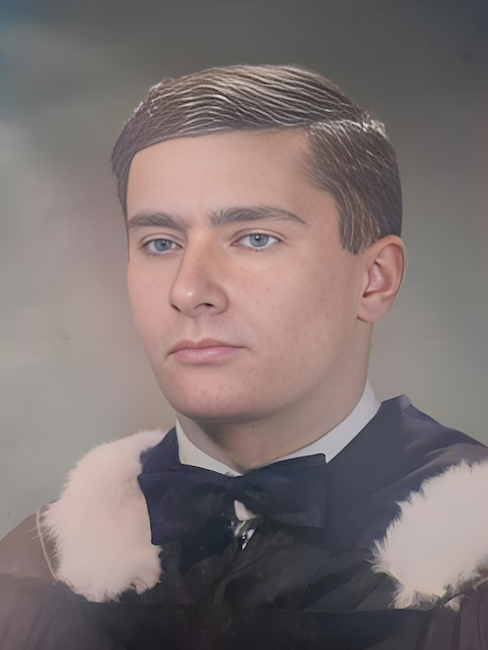
The film is narrated by Leah Ross, a former lawyer and student of Matas’s herself – now a music educator with the Winnipeg School Division. Ross offers her own observations about Matas’s career and how inspiring he has been to law students such as herself. In one touching scene, a group of friends gather to celebrate Matas’s 80th birthday. As the attendees at the party sing “Happy birthday,” Matas recalls the famous opening line of Charles Dickens’ “A Tale of Two Cities”: “It was the best of times, it was the worst of times,” which, he suggests, is a fitting description of his career fighting for human rights around the world.
One especially interesting insight that Matas offers at one point is how he has been able to remain somewhat detached from all the many legal battles in which he has been immersed. He notes, for instance, that while he was subject to occasional antisemitism growing up in north end Winnipeg, his family did not experience the Holocaust, and thus, he did not carry any personal baggage when he began to invest time into dealing with others who had been undergoing persecution.
In addition to focusing on Matas’s long battle of behalf of Falun Gong practitioners, in which he worked together with David Kilgour, to expose the horrible Chinese government practice of executing Falon Gong prisoners so that their organs could be harvested, the film also depicts other battles Matas has waged, on behalf of Wiegers in China (who are Muslim), and Tamils (in Sri Lanka).
Late in the film, we meet Hannah Taylor, another young Winnipeg lawyer, who has also been inspired to work with Matas, helping him to research and prepare briefs for various international bodies around the world. (Although the film doesn’t mention it, Taylor herself achieved quite some renown when, as a very young girl here, she started something called “The Ladybug Foundation,” to help Winnipeggers experiencing homelessness.)
But perhaps as well known as Matas’ work on behalf of repressed minorities in all areas of the globe has been Matas’s efforts to combat antisemitism. As legal counsel for B’nai Brith Canada, Matas’s work investigating Nazi war criminals in Canada is also explored in the film. Snippets of interviews with Michael Mostyn, Chief Executive Officer of B’nai Brith Canada, and Alan Yusim, former Midwest Regional Representative for B’nai Brith Canada, reveal just how extraordinary Matas’s contribution to fighting antisemitism in Canada has been for many years now.
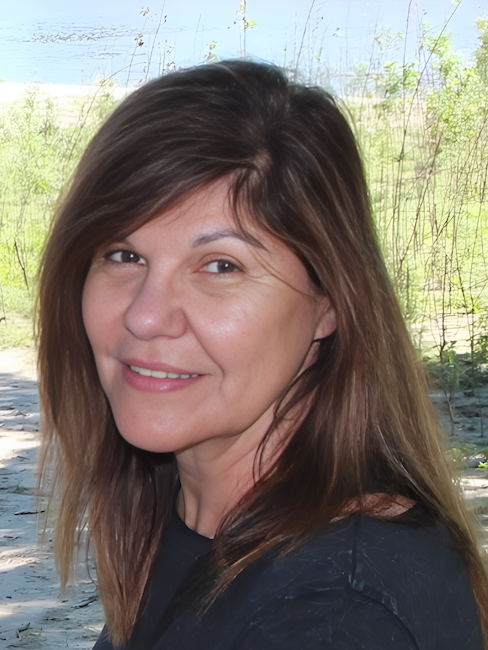
I asked Yolanda Papini-Pollock what led her to want to make a film about David Matas’s career?
She answered: “The idea for this film came from Professor Emeritus Maria Cheung, with whom I previously collaborated on Painful Truth: The Falun Gong Genocide. In that project, we interviewed David Matas about his groundbreaking research into the forced organ harvesting of Falun Gong practitioners in China. The Falun Gong community deeply appreciated David’s tireless efforts to expose these atrocities and wanted to create a tribute to honour him. Professor Cheung along with JadeRose Film and TV productions approached me with the idea, and I was delighted to take it on, as I greatly value David’s work in human rights and his contributions to not only the Jewish but also to communities across Canada and around the world.”
Papini-Pollock says it took her about a year to make the film.
I asked her though, where it might be seen?
She says “B’nai Brith Canada is planning a screening on December 17 in Winnipeg to honor David Matas’ contributions as their senior legal counsel. They also intend to host a screening in Ottawa in February.” The film can also be viewed at https://www.ntdfilms.com/the-justice-hunter/
(I would think “The Justice Hunter” would fit well into the program schedule of a network such as Vision TV, which I’ve contacted to suggest it ought to consider airing the film).
In addition to the film, “The Justice Hunter,” Papini-Pollock has also produced a picture book by the same name, intended for grade school children. She explains that “The idea for the book came to me during the production of the film. As I learned more about David, I felt it was important to share his story with young children as well. David expressed a desire for the film to inspire others to take up human rights work, and I realized that introducing his story to children could be impactful. The challenge, however, was to present his work in an age-appropriate way—something that could inspire without overwhelming or frightening young readers. Crafting a story that balanced these elements was both a struggle and a rewarding experience.”
Papini-Pollock adds that “The book is now available for purchase on various digital platforms, including Amazon, Indigo, and Barnes & Noble, in both soft cover and digital formats. Christine Melnick from Sharing the Magic of Literacy has shown interest in distributing it to schools and remote communities.”
Local News
New Israeli restaurant opens in River Heights

By BERNIE BELLAN (July 6, 2025) It’s been a long time since our community has been able to welcome the opening of a restaurant that specializes in Israeli food.
That void is now going to be filled with the opening of The Green Falafel, at 1833 Grant (corner of Centennial – next to the Subway).
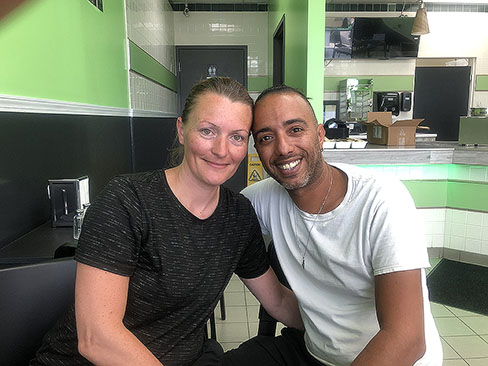
The restaurant is the fulfillment of a dream long held by the husband and wife team of Ariel and Eden Maudi, who have been living in Winnipeg the past 11 years.
Ariel, who was born in Israel and grew up in Beer Sheva, says that he worked in telecommunications in Ramat Gan for several years. He adds though that he had always dreamed of owning his own falafel stand in Israel, but life was difficult there and he decided to come to Canada as a tourist to see whether there were any opportunities here for him, Eden and their two young children.
Eden, who was born in Russia and moved to Israel with her family in 1996, stayed behind with the two kids, who were both pre-schoolers, while Ariel tested the waters in Canada first.
Ariel says he came to Canada as a tourist in 2013. His first stop was in Toronto, where he acquired his 1st class driver’s license. At the end of 2013 he moved to Winnipeg where he began working as a truck driver. Soon he found himself employed as a successful sales person at Vickar Nissan where, he says, he once achieved the status as the top car sales person in Canada. After working at Vickar Nissan for a number of years, Ariel began working as an installer for Bell MTS.
Meanwhile, Eden began working at a Walmart, later at the Costco on Regent.
But, when the opportunity to move into a space that had been previously occupied by another restaurant, but which had closed, became available, Ariel and Eden decided to open their own Israeli restaurant in an area that hadn’t seen Israeli food served since the controversial closure of Bermax Café in 2019.
The Maudis say that they will be serving a variety of Israeli dishes – all vegetarian, and that they will be fully kosher.
The “green” in Green Falafel, by the way, Ariel Maudi explains, comes from the cilantro and parsley that are added to the chickpeas. In addition, their pitas will be coming from Israel and will be baked fresh daily.
The Green Falafel will be open from 10-8 daily. Delivery will be available through Uber Eats and DoorDash.
Call 204-557-7837 for information.
Local News
Previews of shows with Jewish performers at this year’s Fringe Festival July 16-27

For show dates and venues go to winnipegfringe.com
By BERNIE BELLAN As has been our custom for many years now we try to find shows that have either Jewish performers or themes that would have particular appeal for Jewish audiences. Many of the Jewish performers at this year’s festival have been here before, but several are new. In no particular order here are blurbs about the shows we’ve found that fit the criteria I’ve just described. (By they way, if we’ve omitted a show that should be included in our list there’s plenty of time to get added to this post. Just drop me a line at jewishp@mymts.net.)

You’ve Been Served: A One-Woman Show About Divorce, Cults, and Coming of Age at Midlife
Noemi Zeigler
You are hereby summoned… to laugh, cry, and maybe belt out a Streisand number in solidarity. You’ve Been Served is a raw and riotous solo comedy by writer-performer Noemi Zeigler. It all begins when Noemi is served divorce papers on top of a garbage bin lid while taking out the trash—an undignified start to a full-blown midlife unraveling.
At 50, still clinging to her dream of becoming a singer, she falls under the spell of a music producer slash self-help guru, joins a spiritual cult, and, instead of landing a record deal, she lands in jail. Behind bars, with help from her long-buried inner child, she begins to reclaim her voice and her power. Turns out, dreams really do come true—just not the way she expected.
The show features vividly drawn characters—including a manipulative cult leader, a toxic ex-husband, and a jail guard named Roach who shares Noemi’s obsession with the fashion of Charlie’s Angels (the ‘70s TV version, of course.)
With salsa dancing, twerking, and a belting rendition of Don’t Rain on My Parade, Zeigler dives into abandonment, reinvention, and self-rescue. As she confronts perimenopause, she discovers it’s not the end—it’s the new puberty. The show touches on grief, sexuality, and spiritual confusion, but Noemi’s childlike optimism asks: What if your breakdown is actually your breakthrough?

You’re good for nothing… I’ll milk the cow myself
Written & Performed by Natacha Ruck
France, 1981: The first socialist president is about to be elected and young Natacha is ready to implement her own political platform. But first, she has to take down the schoolyard bully,emasculate the rules of French grammar and make off with grandmother’s chocolate.
If you think you know the limits of Jewish mothers, evil grandmothers and transcontinental lovers, meet Natacha Ruck’s family. This true tale of three generations of women, facing three world wars, is equal parts hilarious, shocking and zany.

A One Human Being, Potentially Comedic Performance of Beauty and the Beast NEW WORK!
Written & Performed by Alli Perlov
Be our guest! Local high school drama teacher Alli Perlov is back for a tale as old as time. Can she sing? Not really. Can she act? That’s debatable. Will you laugh? Oh… probably.
Perlov plays dozens of characters, some human, some animal, and many objects, in a comedic exploration of Beauty and the Beast.
In an homage to this brilliant musical adventure, through witty commentary and unstoppable energy, Perlov aims to entertain an audience that isn’t forced to be there like her students.

Hockey Sticks and Beaver Pie
Written & Performed by Melanie Gall
Take a trip around Manitoba. From the 30,000 ft. St. Adolphe snow maze to the Narcisse snake dens! After all, where else holds both the title of Slurpee Capital of the World and the Guinness Record for the most people simultaneously howling like wolves?
Deanna Durbin, Terry Jacks and Burton Cummings are among the many homegrown stars, and Hockey Sticks features their music along with original songs and the stories that make this province unique.
Starring Melanie Gall from past shows Piaf & Brel, Ingenue and Toast to Prohibition
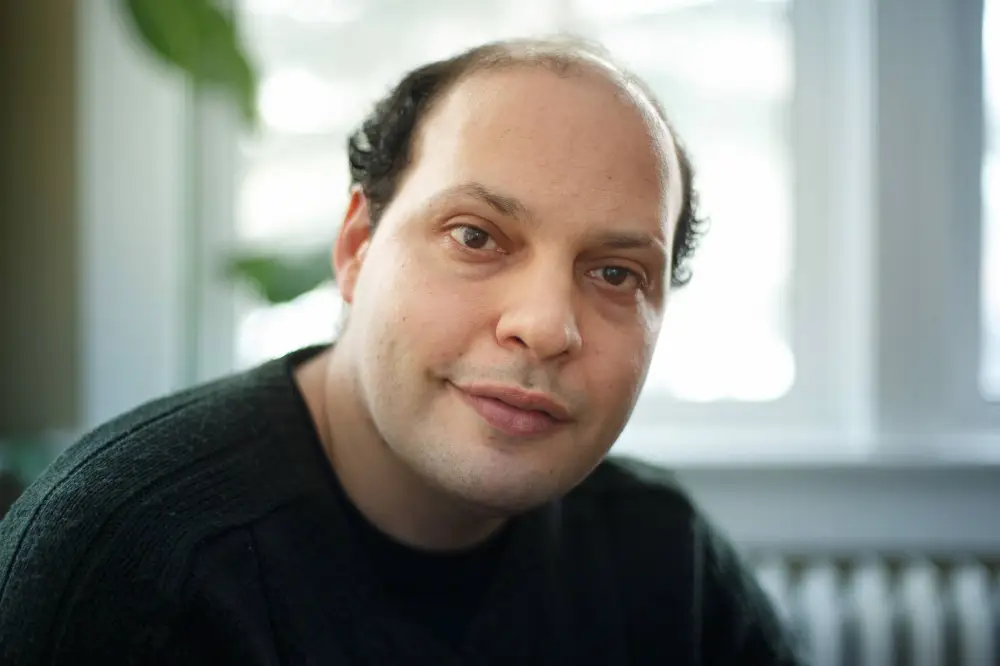
Nerohilarity Exposed
Produced by Adam Schwartz
We all sometimes feel exposed, whether that’s as a fraud or a pretender.
The performers of the award-winning Neurohilarity show, Danielle Kayahara (Laugh Out Loud CBC), Carole Cunningham (Yuk Yuks, The Debaters), Adam Schwartz (Winnipeg Fringe) and Rollin Penner (Yuk Yuks, CBC, Rumors, Winnipeg Comedy Festival), apply a comedic spin to the experiences that make us feel insecure, stripping away the emotional weight with nittygritty jokes and stories that will have you laughing uproariously.
Brilliantly awkward.

A Lesbian in the Kitchen
Willow Rosenberg
Professional lesbian Willow Rosenberg takes you on a journey through the centuries, superstitions and tablespoons of her lifelong passion for baking in this spiritual successor to 2024’s Jenny Award-nominated A Lesbian in a Bear Store.
Whether you have a favourite spatula, bake once or twice a year, or live in constant fear of being told to “just fold it in”, this one-woman show about family, joy, tradition (but make it gay),
Judaism, comfort, home (but make it gayer*), love, chemistry and magic is for you!
*Who’re we kidding, it’s all gay!

Eleanor’s Story: An American Girl in Hitler’s Germany
Written & Performed by Ingrid Garner
(Ed. note: Although Ingrid Garner isn’t Jewish, we thought the theme of this show might have a special appeal for Jewish readers.)
Based on Eleanor Ramrath Garner’s best-selling memoir, this 16x internationally award-winning adaptation – performed by her granddaughter, Ingrid Garner – details Eleanor’s youth as an American caught in Second World War Berlin.
Punctuated with humour and accompanied by cinematic sound and video, Garner embodies her ancestors in this coming-of-age odyssey, delivering an account of war that is more relevant than ever.
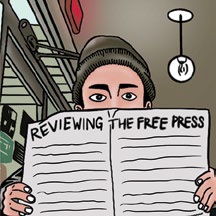
Reviewing The Free Press 2
Benji Rothman
The Winnipeg Free Press has run amok, reviewing each and every Fringe show over the past two decades without consequence or recourse. Now, it’s their turn… again.
In this refurbished work that debuted at last year’s Winnipeg Fringe, Benji Rothman once again takes the Winnipeg Free Press to task. In this (mostly) new, (hopefully) hilarious 45-minute show, Rothman dives deep into their past and exposes their faulty journalism, imbalanced reporting and, of course, embarrassing typos.
Local News
Jewish performers at this year’s Winnipeg Folk Festival July 10-13

The Black Sea Station
Long ago, there were the klezmorim, itinerant musicians who roamed the back streets of Eastern Europe, playing at parties for meals and a few coins. The sound they honed then was a visceral exploration of life’s joy, and its loss; they could whip audiences into a frenzy of dancing, or bring them to tears with the mournful wail of a clarinet. Today, Winnipeg’s own The Black Sea Station is carrying on this tradition. Featuring Daniel Koulack (bass), Victor Schultz (violin) and Myron Schultz (clarinet) — cofounders of seminal local klezmer act Finjan — along with Moldovan accordion wizard Nikolai Prisacar and multi-instrumentalist Ben Mink, the quintet transports listeners to a time and place long past. Through a mix of original songs rooted in history, and traditional tunes spun up with modern zest, they whirl through the exuberant klezmer sounds of their Eastern European heritage, tending the old ways with deep love and respect.
The Black Sea Station will be performing Sunday, July 13, at 1:00 pm in Snowberry Field.
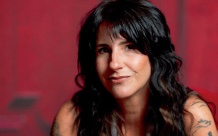
Romi Mayes
Romi Mayes has taken some hard knocks in her life, but she’s never faded away. For more than 25 years, Manitoba’s first lady of blues-rock has been a lynchpin of the Canadian roots scene. She earned that position the old-fashioned way, through her gritty, passionately emotive music. With her sizzling guitars and full-throated rasp, the Juno-nominated performer howls and purrs through razor-edged lyrics, rocking out wherever she can find a stage. She’s long been one of the hardest-working musicians on the circuit, keeping a busy slate of gigs and mentoring up-and-coming artists to get a foothold on the trails she blazed. Now, after a nine-year hiatus from the studio, Mayes has put her scintillating sound back on record with her long-awaited seventh album, Small Victories — a return that leaves no doubt, no matter the ups and downs, Mayes is here to stay.
Romi will be performing Friday, July 11, at 1:00 pm in Burr Oak.

Leonard Podolak (with Matt Gordon)
Ireland’s Matt Gordon is a fiddler and singer, whose fleet-footed clogging and thigh-slapping hambone has taken stages by storm since the 1980s. Leonard Podolak is a virtuosic master of the clawhammer banjo, who for decades has whipped up some of Manitoba’s wildest roots parties with his band, The Duhks. Put those talents together, and they can promise you this much: we’re all gonna have a real good time. Longtime friends and musical collaborators, Gordon and Podolak deliver an exhilarating trip through old-time Appalachian music. Their performances seamlessly blend intricate instrumental lines with heartfelt singing and dazzling dance. They’ve teamed up on a few records over the years, including 2020’s bigband extravaganza Power Wagon: Live At Shanley’s. But the best way to experience this duo’s toe-tapping, hand-clapping chemistry is to see it live.
Podolak and Gordon will be performing A concert with a side of clogging Sunday, July 13, at 3:00 pm in Folk School.
